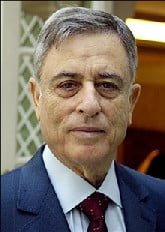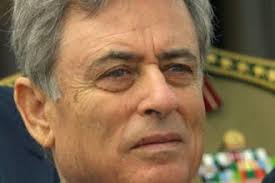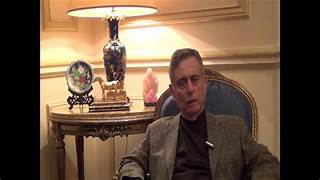Cairo – Jacqueline Zaher – Former Deputy President of the Arab Republic of Syria, Abdul Halim Khaddam, considered the Syrian army’s invasion of the city of Hama yesterday, Sunday, to be the true beginning of the end of the Bashar al-Assad regime.
Khaddam affirmed in a telephone call with the German news agency (dpa) from Cairo that “the acts of violence, killing, and military invasion, as happened yesterday in Hama and previously in Homs and other areas, and which is likely to continue, all collectively mean one thing: Syria will move into a new phase that will ultimately lead to the end of the Bashar al-Assad regime.”
The Syrian army and security forces began a large-scale invasion of the city of Hama at dawn yesterday, resulting in the killing of more than a hundred people and the injuring of hundreds.
Khaddam, who currently leads the opposition National Salvation Front against the Syrian regime, revealed his efforts to urge the international community to establish protected areas within Syria to serve as a refuge for Syrians fleeing from killings and intimidation. He explained, “We are currently urging the international community to work on creating protected areas to protect people who are fleeing killings.”
He added, “There must be some form of international intervention to protect the Syrian people, considering that the Syrians are determined that their protests remain peaceful without resorting to weapons. With the regime’s continued severe repression, it is the duty of the international community, in accordance with the United Nations Charter, to take measures to protect the Syrian people from this regime that has lost its national and international legitimacy.”
The United States and the European Union impose sanctions, including asset freezes and travel bans, on thirty individuals in the Syrian regime, headed by President Bashar al-Assad.
Khaddam warned against the excessive use of violence by the regime, as well as the ongoing international silence and hesitation of the international community to fulfill its responsibilities in protecting the Syrian people from the severe violations committed by the regime. He warned that this “will push forces in the Syrian street to respond to violence with violence.”
He continued, “So far, the Syrians have borne all the crimes committed by the regime, out of their keenness not to slide into conflict or discord that would lead to further bloodshed.”
Khaddam also rejected the notion of the “Islamization” of the revolutionary movement in Syria, emphasizing, “Those who describe the revolution as Islamic are the regime’s group. Syria is a country with Muslims and Christians, both of whom are religious but have never been extremists… Muslims constitute the overwhelming majority in the country and therefore appear as the clear numerical majority in the protests, which is natural.”
He affirmed, “However, they are not an extremist majority at all, and I am certain that there is no Islamic trend towards extremism in Syria.”
Khaddam noted that the events of yesterday proved that history repeats itself. He added, “The regime has no connection to the people and therefore has no choice but to use violence and force to stay in power. This matter, although it happened in the past due to regional and international conditions, will not repeat itself under the current circumstances. Bashar al-Assad and the gang that works with him will face a difficult reckoning.”
Yesterday’s re-invasion of Hama brought back memories of the massacres witnessed by the city in 1982, at the hands of the late Syrian President Hafez al-Assad’s regime, when the Sunni city attempted to revolt against the ruling Alawite family.
Responding to a question about the reasons for the Syrian regime’s resistance for nearly five months since the outbreak of protests in mid-March of last year, despite many analysts predicting its rapid fall, Khaddam answered, “Practically, the Syrian regime lost its popular legitimacy. This regime cannot move except through artillery, tanks, and aircraft, because it does not feel secure. It lives in fear of its people and fears the latter’s retribution for the crimes it has committed against them.”
He added, “I do not want to specify certain days, but the regime actually fell from the first day it resorted to using weapons against its people. Today, it is trying to extend its presence, but to no avail.”
Khaddam also downplayed the possibility of relying on military defections within the Syrian army and the ability of some officers to save Syria from the Bashar regime, explaining, “They are a group of officers, whether they number five, twenty, or more. This does not constitute an army. The army has other requirements that are not available under the current circumstances.”
He added, “These officers left the ranks of the army because they do not want to kill their fellow citizens, but it cannot be said that they constitute an army that can save Syria now. What can actually save Syria is the cooperation of the Syrian people’s forces, their resilience, and their realization of the danger of the Assad regime’s continued existence.”
Khaddam also dismissed the idea of a military coup by the leaders who continue to support the Bashar regime, stating, “Under the current circumstances, this is unexpected, but it may occur at a certain stage. Some leaders within the army may rebel and arrest other military and political leaders affiliated with the regime.”
He saw that this possibility is “possible, especially with the increasing state of tension and pressure in the country, which has exhausted the army, in addition to the collapsing economic situation, which will provide more impetus for all forces to move and overthrow this regime.” Khaddam rejected statements by officials about the strength and resilience of the Syrian economy, considering their statements “a form of misleading the people.”
He affirmed, “What they are saying is not true… If everything is fine, why did they print tens of billions of Syrian pounds in Austria and Germany and deposit them in the central bank to pay salaries and manage government affairs? And why are they deducting nearly five hundred pounds per month from the salary of every employee under the slogan of supporting the Syrian pound?”
He added, “They are trying to mislead people, but these individuals know the dire situation well because they are living in an environment imposed by the country’s poor economic condition. They are aware of rising prices and inflation; they know that no one is working anymore, as the industry, agriculture, and tourism are all stagnant. I wonder about what good situation they are talking about. The state’s resources have decreased to an extent that is insufficient to meet even 25% of the country’s budget requirements.”
Khaddam acknowledged the validity of the criticisms directed by domestic forces towards the external opposition for holding conferences that cost a tremendous amount of money without yielding results that support the revolutionary movement or, despite their frequency, lead to the unity of that opposition into a strong entity representing Syria. He explained, “The issue of conferences has two negative aspects. Firstly, it shows that there are differences within the opposition regarding the overall situation, despite everyone agreeing on the regime’s downfall. Secondly, they incur enormous costs. Syrians need that money, as it could be used to aid and assist those who have fled to Lebanon, Turkey, and Jordan.”
He added, “These conferences have not addressed an important issue, which is how to confront the regime. Confrontation does not come from holding conferences or issuing statements; it comes from organizing effectively, rallying popular forces, mobilizing public opinion in the Arab and global communities. In this regard, there is a shortcoming within the external opposition.”
He continued, “As for the opposition within the country, they are not to blame because they are individuals doing everything they can to stand firm and achieve the goals of the revolution.”




